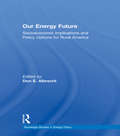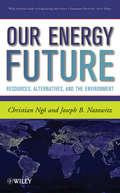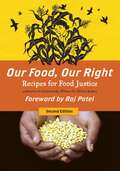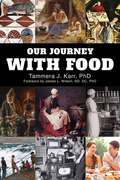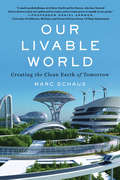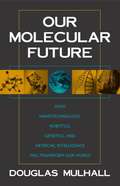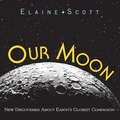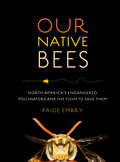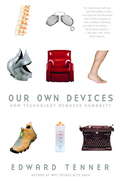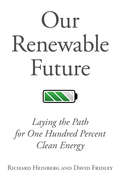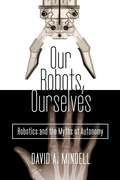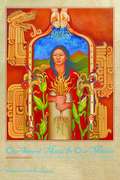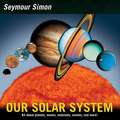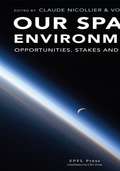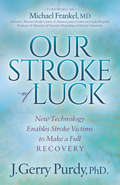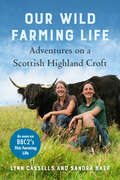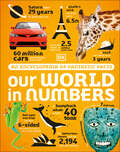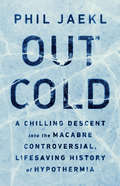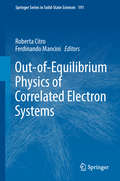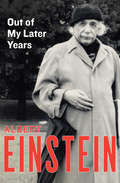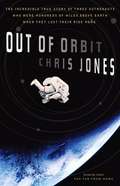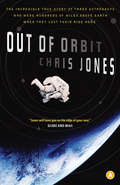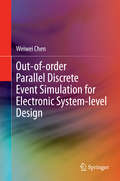- Table View
- List View
Our Energy Future: Socioeconomic Implications and Policy Options for Rural America (Routledge Studies in Energy Policy)
by Don E. AlbrechtRapid changes in energy production and consumption are having major socioeconomic implications for the communities of rural America. Technological developments in horizontal drilling, hydraulic fracturing (fracking) nuclear energy, biofuels, wind and solar energy have significantly increased domestic energy production and the production of energy from renewable sources has encouraged energy efficiency. Yet, severe concerns persist and policy decisions on energy issues will have profound implications for all Americans and rural communities where consequences are experienced most directly. Thus, the time is appropriate for a careful exploration of the socioeconomic implications of our energy future. The purpose of this book is to present timely and scientifically sound information on energy policy, socioeconomic aspects of energy production and consumption with a focus on rural areas. The book presents the latest research by top scholars with the goal of clarifying options and providing the basis for informed policy decisions.
Our Energy Future
by Christian Ngô Joseph B. NatowitzA Wiley Survival Guide on our Energy Future Concerned about our energy future? Turn to this guide for easy-to-grasp and up-to-date coverage of the many aspects of the energy value chain: Oil and natural gas Coal Fossil fuels and the greenhouse effect Energy from water Biomass Solar energy Geothermal energy Wind energy Nuclear energy Electricity Energy storage Transportation Housing Smart energy consumption Hydrogen Armed with the knowledge in this book, students, teachers, decision-makers, politicians, and consumers can form educated and informed opinions on the future of energy and its impact on the economy, health, and the environment.
Our Food Our Right: Recipes for Food Justice
by Community Alliance for Global JusticeThe new 2nd edition of "Our Food, Our Right: Recipes for Food Justice" includes a Foreword by Raj Patel. The book has a focus on “Stories of Change” - stories of successful initiatives locally and globally that are helping to create more sustainable food communities. The texts combine hands-on tools for change with community recipes and political awareness to engage you in joining in the struggle for food justice! Our Food, Our Right promotes community knowledge sharing, self-sufficiency, accessibility, and food justice through a food sovereignty framework. Our Food, Our Right takes you on a journey through many of the current food system's failures, and showcases creative solutions that communities are designing to regain control over their food, and the health of their bodies and neighborhoods. This guide has the tools you need to take back your food choices and stand up for the right of all people to good, healthy, and culturally appropriate food!
Our Journey with Food
by Tammera J. KarrOur Journey with Food is intended to provide both historical and nutrition information about the foods we eat and have traditionally eaten as a society. It includes many direct quotes from original case studies, scientific journals, and other reputable sources. All of the research sources are located in the footnotes. Supplementing the text are several historical photographs culled from archives, libraries and museums.
Our Livable World: Creating the Clean Earth of Tomorrow
by Marc SchausA vital guide to the frontlines of our fight against climate change and the scientific and technological innovations that will revolutionize the world. The United States&’ accelerated plans to combat the existential threat of climate change finally give reason to hope. In Our Livable World, research specialist and author Marc Schaus explores the incredible new green innovations in science and engineering that can allow us to avoid the worst repercussions of global warming as we work to usher in a sustainable, livable world. To beat a challenge the size of climate change, our solutions will have to be ambitious: solar thermal cells capable of storing energy long after the sun goes down, &“smart highways&” designed to charge your vehicle as you drive, indoor vertical farms automated to maximize crop growth with no pesticides, bioluminescent vines ready to one day replace our streetlights, jet fuel created from landfill trash—and next-generation carbon capture techniques to remove the emissions we have already released over the past several decades. Far from the geoengineering schemes of cli-fi action thrillers, real solutions are being developed, right this moment. Our Livable World features interviews with the innovators, real talk on the revolutionary technology, and a clear picture of a cleaner planet in the future. &“An important book that shows the dawn of a new kind of environmental movement―an age where we invest in deeply creative and fascinating technical solutions that work in harmony with the Earth. Marc Schaus lays out the exciting future of environmental innovation before us.&” —Katie Patrick, author of How to Save the World
Our Molecular Future: How Nanotechnology, Robotics, Genetics, and Artificial Intelligence Will Transform Our World
by Douglas MulhallWhen Mulhall sees the future, he pictures every home having a virtually cost-free desktop fabricator, not unlike an ink jet printer, that is able to create any three-dimensional object desired; he envisions being able to change the color of a car, or clothes, simply by speaking. Mulhall, who heads an environmental software consultancy, believes that nanotechnology, the ability to rearrange individual atoms, will lead to technological advances that will change every aspect of our world, including our own species. He postulates that nanotechnology will lead to such leaps forward in computing power that we will soon create robots capable of independent thought, emotional response and reproduction.
Our Moon: New Discoveries About Earth's Closest Companion
by Elaine ScottSince the dawn of human existence, people have gazed up at the night sky and wondered about the moon. Here the veteran nonfiction author Elaine Scott skillfully presents a wealth of captivating, kid-friendly information, covering everything from the newest theories on how the moon formed, to the recent, startling discovery of water on its surface and the very real possibility of future moon colonies. Illustrated with stunning, full-color photographs and packed with fun facts, this is the most complete and up-to-date book available on the moon. Includes glossary, bibliography, and index.
Our Native Bees: North America's Endangered Pollinators and the Fight to Save Them
by Paige Embry"Captures the essence of a bee’s natural history and how we use (and sometimes abuse) bees.” —Olivia Messinger Carril, author of The Bees in Your Backyard Honey bees get all the press, but the fascinating story of North America’s native bees—an endangered species essential to our ecosystems and food supplies—is just as crucial. Through interviews with farmers, gardeners, scientists, and bee experts, Our Native Bees explores the importance of native bees and focuses on why they play a key role in gardening and agriculture. The people and stories are compelling: Paige Embry goes on a bee hunt with the world expert on the likely extinct Franklin’s bumble bee, raises blue orchard bees in her refrigerator, and learns about an organization that turns the out-of-play areas in golf courses into pollinator habitats. Our Native Bees is a fascinating, must-read for fans of natural history and science and anyone curious about bees.
Our Own Devices: How Technology Remakes Humanity
by Edward TennerThis delightful and instructive history of invention shows why National Public Radio dubbed Tenner "the philosopher of everyday technology." Looking at how our inventions have impacted our world in ways we never intended or imagined, he shows that the things we create have a tendency to bounce back and change us. The reclining chair, originally designed for brief, healthful relaxation, has become the very symbol of obesity. The helmet, invented for military purposes, has made possible new sports like mountain biking and rollerblading. The typewriter, created to make business run more smoothly, has resulted in wide-spread vision problems, which in turn have made people more reliant on another invention--eyeglasses. As he sheds light on the many ways inventions surprise and renew us, Tenner considers where technology will take us in the future, and what we can expect from the devices that we no longer seem able to live without.
Our Renewable Future: Laying the Path for One Hundred PercClean Energy
by Richard Heinberg David FridleyThe next few decades will see a profound energy transformation throughout the world. By the end of the century (and perhaps sooner), we will shift from fossil fuel dependence to rely primarily on renewable sources like solar, wind, biomass, and geothermal power. Driven by the need to avert catastrophic climate change and by the depletion of easily accessible oil, coal, and natural gas, this transformation will entail a major shift in how we live. What might a 100% renewable future look like? Which technologies will play a crucial role in our energy future? What challenges will we face in this transition? And how can we make sure our new system is just and equitable? In Our Renewable Future, energy expert Richard Heinberg and scientist David Fridley explore the challenges and opportunities presented by the shift to renewable energy. Beginning with a comprehensive overview of our current energy system, the authors survey issues of energy supply and demand in key sectors of the economy, including electricity generation, transportation, buildings, and manufacturing. In their detailed review of each sector, the authors examine the most crucial challenges we face, from intermittency in fuel sources to energy storage and grid redesign. The book concludes with a discussion of energy and equity and a summary of key lessons and steps forward at the individual, community, and national level. The transition to clean energy will not be a simple matter of replacing coal with wind power or oil with solar; it will require us to adapt our energy usage as dramatically as we adapt our energy sources. Our Renewable Future is a clear-eyed and urgent guide to this transformation that will be a crucial resource for policymakers and energy activists.
Our Robots, Ourselves
by David A. Mindell"[An] essential book... it is required reading as we seriously engage one of the most important debates of our time."--Sherry Turkle, author of Reclaiming Conversation: The Power of Talk in a Digital AgeFrom drones to Mars rovers--an exploration of the most innovative use of robots today and a provocative argument for the crucial role of humans in our increasingly technological future. In Our Robots, Ourselves, David Mindell offers a fascinating behind-the-scenes look at the cutting edge of robotics today, debunking commonly held myths and exploring the rapidly changing relationships between humans and machines. Drawing on firsthand experience, extensive interviews, and the latest research from MIT and elsewhere, Mindell takes us to extreme environments--high atmosphere, deep ocean, and outer space--to reveal where the most advanced robotics already exist. In these environments, scientists use robots to discover new information about ancient civilizations, to map some of the world's largest geological features, and even to "commute" to Mars to conduct daily experiments. But these tools of air, sea, and space also forecast the dangers, ethical quandaries, and unintended consequences of a future in which robotics and automation suffuse our everyday lives. Mindell argues that the stark lines we've drawn between human and not human, manual and automated, aren't helpful for understanding our relationship with robotics. Brilliantly researched and accessibly written, Our Robots, Ourselves clarifies misconceptions about the autonomous robot, offering instead a hopeful message about what he calls "rich human presence" at the center of the technological landscape we are now creating. From the Hardcover edition.
Our Sacred Maíz Is Our Mother: Indigeneity And Belonging In The Americas
by Roberto Cintli RodríguezBrings together scholarly and traditional (elder) knowledge about the long history of maiz/corn cultivation and culture, its roots in Mesoamerica, and its living relationship to Indigenous peoples throughout the continent, including Mexicans and Central Americans now living in the United States.
Our Solar System: Revised Edition (Seymour Simon Science Ser.)
by Seymour SimonJoin award-winning science writer Seymour Simon in this completely updated edition of Our Solar System, as he takes young readers on a fascinating tour through space! With beautiful full-color photographs and spacecraft images, including many taken by the Mars rovers and Hubble Space Telescope, this nonfiction picture book teaches young readers all about the solar system, including the sun, the eight planets, and their moons. Covering all the latest discoveries in space, young astronomers will be over the moon about the fun facts, fascinating science, and incredible photographs. A must-have for every child interested in outer space! This book includes an author's note, a glossary, an index, and further reading suggestions. An excellent choice for classrooms and homeschooling, Our Solar System supports the Common Core State Standards.Check out these other Seymour Simon books about the universe and space:Comets, Meteors, and AsteroidsDestination: JupiterDestination: MarsDestination: SpaceExoplanetsGalaxiesStarsThe SunThe Universe
Our Space Environment, Opportunities, Stakes and Dangers
by Claude Nicollier Roger-Maurice BonnetThe space surrounding our planet is full of opportunities and resources. Ranging from a hundred to a few thousand kilometers around Earth, our space-neighborhood offers an excellent vantage point to the universe, and a great opportunity to push the frontiers of science and knowledge. Manned missions advance research on human biology, health, and li
Our Stroke of Luck: New Technology Enables Stroke Victims to Make a Full Recovery
by J. Gerry PurdyMost people think that stroke victims end up looking like Frankenstein with a horrible facial expression and erratic movements. But, that is not the way it has to be. Today, it is possible for some stroke victims to make a full recovery. Gerry Purdy knows this because his wife, Alicia – a healthy, beautiful and smart person – suffered a stroke on August 23, 2011 and was able to return to her vivacious self.Our Stroke of Luck portrays the life they had together. Gerry and Alicia had dated in high school and got back together for their 45th high school reunion. Life was good. And then – Bam! – without warning Alicia suffered a stroke. Find out how Alicia’s neurosurgeon was able to remove the clot from her brain that caused the stroke. Experience the tense ups and downs of that night—one moment seeming as though she might be paralyzed on her left side for the rest of her life and then the next seeing a flash of hope. Gerry and Alicia were lucky that the radiologist was able to identify the clot in her brain and lucky to get her transferred to the Marcus Stroke Center at Grady Hospital in Atlanta. They were lucky that Dr. Nogueira was able to extract the clot from Alicia’s brain. And, finally, they were lucky that she was able to make a full recovery. Truly, this was their stroke of luck.
Our War on Ourselves
by Willem H. VanderburgOur approach to knowing and doing is based on delegating physical phenomena to physicists, biological phenomena to biologists, social phenomena to sociologists, economic phenomena to economists, and so on. This approach to knowledge and practice works very well when one category of phenomena dominates (as in mechanical and technical systems), but does not work when many categories of phenomena make significant contributions (as in the biological and cultural spheres). As a result, our civilization succeeds in its scientific and technical endeavours yet fails in dealing with communities and ecosystems.Following his groundbreaking Labyrinth of Technology and Living in the Labyrinth of Technology, Willem H. Vanderburg's Our War on Ourselves explores the type of war we have unleashed on our lives by emphasizing discipline-based processes. The work also illuminates how we can achieve a more balanced, livable, and sustainable future by combining technical and cultural perspectives in our educational and institutional settings.
Our Wild Farming Life: Adventures on a Scottish Highland Croft
by Lynn Cassells Sandra BaerAs seen on the BBC’s This Farming Life The inspirational story of Lynbreck Croft—a regenerative Scottish farm rooted in local food, community, and the dreams of two women. "A ripping good account of the guts, luck and perseverance it takes to create a productive and healthy farm or croft that jumps the rails of our conventional industrial agriculture."—Nick Offerman, New York Times bestselling author of Where the Deer and the Antelope Play "I raced through this beautiful story with mounting awe and excitement. . . . Pragmatism, honesty and openness to new and old ideas shines through on every page. I hope it inspires legions of new farmers."—Isabella Tree, author of Wilding Lynn and Sandra left their friends, family, and jobs in England to travel north to Scotland to find a bit of land that they could call their own. They had in mind keeping a few chickens, a kitchen garden, and renting out some camping space; instead, they fell in love with Lynbreck Croft—150 acres of opportunity and beauty, shrouded by the Cairngorms and deep in the Highlands of Scotland. But they had no money, no plan, and no experience in farming. In Our Wild Farming Life, Lynn and Sandra recount their experiences as they rebuild their new home and work out what kind of farmers they want to be. They learn how to work with Highland cattle, become part of the crofting community and begin to truly understand how they can farm in harmony with nature to produce wonderful food for themselves and the people around them. Through efforts like these, Lynn and Sandra have been able to combine regenerative farming practices with old crofting traditions to keep their own personal values intact. Our Wild Farming Life is what happens when you follow your dreams of living on the land; a story of how two people became farmers—and how they learned to make a living from it, their way. "[This] is a warm yet realistic chronicle of the world of the small-time farmer, sharing a vision of how we humans can feed ourselves sustainably and ethically while living in harmony with the natural world."—Booklist "For anyone who has ever sat in a city office dreaming of . . . living off the land, this book will inspire them to take the plunge."—The Telegraph
Our World in Numbers (DK Oour World in Numbers)
by DKZillions of fun figures at your fingertips!Are you eager to know all the most incredible facts and stats? Would you like to number-crunch your way around the wonders of our world?Arm yourself with nuggets of number knowledge and fantastic figures with this data-filled book that explores everything in our world from space to sports and animals to art. How long does it take to put on a spacesuit? How many times does a sloth poop in a week? How many stone blocks are there in the Great Pyramid at Giza? What percentage of your brain do you really use? With intriguing fact-bites and colorful data graphics, Our World in Numbers takes you on a remarkable adventure by numbers, telling you everything you could possibly need to know--and more!
Out Cold: A Chilling Descent into the Macabre, Controversial, Lifesaving History of Hypothermia
by Phil Jaekl&“A fascinating look into the strange and sometimes unbelievable history of hypothermic medicine. Jaekl weaves together a story that is part history lesson and part science thriller. This is truly a must-read for any fan of science and science fiction!&” —Douglas Talk, MD/MPH, chief medical consultant, SpaceWorks Inc., Human Torpor Project The meaning of the word &“hypothermia&” has Greek origins and roughly translates to &“less heat.&” Its symptoms can be deadly—shivering, followed by confusion, irrationality, and even the illusion of feeling hot. But hypothermia has another side—it can be therapeutic. In Out Cold, science writer Phil Jaekl chronicles the underappreciated story of human innovation with cold, from Ancient Egypt, where it was used to treat skin irritations, to eighteenth-century London, where scientists used it in their first explorations of suspended animation. Throughout history, physicians have used cold to innovate life extension, enable distant space missions, and explore consciousness. Hypothermia may still conjure macabre images, like the bodies littering Mt. Everest and disembodied heads in cryo-freezers, but the reality is that modern science has invented numerous new life-saving cooling techniques based on what we&’ve learned over the centuries. And Out Cold reveals a surprisingly warm future for this chilling state.
Out-of-Equilibrium Physics of Correlated Electron Systems (Springer Series in Solid-State Sciences #191)
by Roberta Citro Ferdinando ManciniThis book is a wide-ranging survey of the physics of out-of-equilibrium systems of correlated electrons, ranging from the theoretical, to the numerical, computational and experimental aspects. It starts from basic approaches to non-equilibrium physics, such as the mean-field approach, then proceeds to more advanced methods, such as dynamical mean-field theory and master equation approaches. Lastly, it offers a comprehensive overview of the latest advances in experimental investigations of complex quantum materials by means of ultrafast spectroscopy.
Out of My Later Years: The Scientist, Philosopher, and Man Portrayed Through His Own Words
by Albert EinsteinAn inspiring collection of essays, in which Albert Einstein addresses the topics that fascinated him as a scientist, philosopher, and humanitarian Divided by subject matter—&“Science,&” &“Convictions and Beliefs,&” &“Public Affairs,&” etc.—these essays consider everything from the need for a &“supranational&” governing body to control war in the atomic age to freedom in research and education to Jewish history and Zionism to explanations of the physics and scientific thought that brought Albert Einstein world recognition. Throughout, Einstein&’s clear, eloquent voice presents an idealist&’s vision and relays complex theories to the layperson. Einstein&’s essays share his philosophical beliefs, scientific reasoning, and hopes for a brighter future, and show how one of the greatest minds of all time fully engaged with the changing world around him. This authorized ebook features rare photos and never-before-seen documents from the Albert Einstein Archives at the Hebrew University of Jerusalem.
Out of My Later Years: The Scientist, Philosopher, and Man Portrayed Through His Own Words
by Albert EinsteinAn inspiring collection of essays, in which Albert Einstein addresses the topics that fascinated him as a scientist, philosopher, and humanitarian Divided by subject matter—&“Science,&” &“Convictions and Beliefs,&” &“Public Affairs,&” etc.—these essays consider everything from the need for a &“supranational&” governing body to control war in the atomic age to freedom in research and education to Jewish history and Zionism to explanations of the physics and scientific thought that brought Albert Einstein world recognition. Throughout, Einstein&’s clear, eloquent voice presents an idealist&’s vision and relays complex theories to the layperson. Einstein&’s essays share his philosophical beliefs, scientific reasoning, and hopes for a brighter future, and show how one of the greatest minds of all time fully engaged with the changing world around him. This authorized ebook features rare photos and never-before-seen documents from the Albert Einstein Archives at the Hebrew University of Jerusalem.
Out of Orbit: The True Story of How Three Astronauts Found Themselves Hundreds of Miles Above the Earth with No Way Home
by Chris JonesAn adventure set on the most dangerous frontier of all--outer space. In the nearly forty years since Neil Armstrong walked on the moon, space travel has come to be seen as a routine enterprise--at least until the shuttle "Columbia" disintegrated.
Out of Orbit: The True Story of How Three Astronauts Found Themselves Hundreds of Miles Above the Earth With No Way Home
by Chris JonesIn February 2003, American astronauts Donald Pettit and Kenneth Bowersox and Russian flight engineer Nikolai Budarin were on a routine fourteen-week mission maintaining the International Space Station. But then the space shuttle Columbia exploded far beneath them. With the launch program suspended indefinitely, these astronauts had suddenly lost their ride back to earth. Out of Orbit chronicles the efforts of the beleaguered mission controls in Houston and Moscow as they worked frantically against the clock, ultimately settling on a plan that felt, at best, like a long shot. Latched to the side of the space station was a Russian-built Soyuz TMA-1 capsule, the rocket equivalent of a 1976 Gremlin. Despite the inherent danger, the Soyuz became the only hope to return Bowersox, Budarin, and Pettit home. Their harrowing journey back to earth is a powerful reminder that space travel remains an incredibly dangerous pursuit.
Out-of-order Parallel Discrete Event Simulation for Electronic System-level Design
by Weiwei ChenThis book offers readers a set of new approaches and tools a set of tools and techniques for facing challenges in parallelization with design of embedded systems. It provides an advanced parallel simulation infrastructure for efficient and effective system-level model validation and development so as to build better products in less time. Since parallel discrete event simulation (PDES) has the potential to exploit the underlying parallel computational capability in today's multi-core simulation hosts, the author begins by reviewing the parallelization of discrete event simulation, identifying problems and solutions. She then describes out-of-order parallel discrete event simulation (OoO PDES), a novel approach for efficient validation of system-level designs by aggressively exploiting the parallel capabilities of todays' multi-core PCs. This approach enables readers to design simulators that can fully exploit the parallel processing capability of the multi-core system to achieve fast speed simulation, without loss of simulation and timing accuracy. Based on this parallel simulation infrastructure, the author further describes automatic approaches that help the designer quickly to narrow down the debugging targets in faulty ESL models with parallelism.
